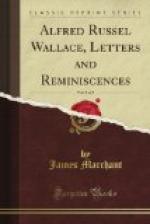Wallace’s critical faculty was always keen and vigilant. Unlike some critics, however, he relished genuine and well-informed criticism of his own writings. Flattery he despised; whilst the charge of dishonesty aroused strongest resentment. Deceived he might be, but he required clear proof that his own eyes and ears had led him astray. Romanes, who had propounded the forgotten theory of physiological selection, charged Wallace with adopting it as his own. This was not only untrue, it was ridiculous; and Wallace, after telling him so and receiving no apology, dropped him out of his recognition. During Romanes’ illness Mr. Thiselton-Dyer wrote to Wallace and sought to bring about a reconciliation, and Wallace replied:
* * * * *
Parkstone, Dorset. September 26, 1893.
My dear Thiselton-Dyer,—I am sorry to hear of Romanes’ illness, because I think he would have done much good work in carrying out experiments which require the leisure, means and knowledge which he possesses. I cannot, however, at all understand his wishing to have any communication from myself. I do not think I ever met Romanes in private more than once, when he called on me more than twenty years ago about some curious psychical phenomena occurring in his own family; and perhaps half a dozen letters—if so many—may have passed between us since. There is therefore no question of personal friendship disturbed. I consider, however, that he made a very gross misstatement and personal attack on me when he stated, both in English and American periodicals, that in my “Darwinism” I adopted his theory of “physiological selection” and claimed it as my own, and that my adoption of it was “unequivocal and complete.” This accusation he supported by such a flood of words and quotations and explanations as to obscure all the chief issues and render it almost impossible for the ordinary reader to disentangle the facts. I told him then that unless he withdrew this accusation as publicly as he had made it I should decline all future correspondence with him, and should avoid referring to him in any of my writings.
This is, of course, very different from any criticism of my theories; that, or even ridicule, would never disturb me; but when a man has made an accusation of literary and scientific dishonesty, and has done all he can to spread this accusation over the whole civilised world, my only answer can be—after showing, as I have done (see Nature, vol. xliii., pp. 79 and 150), that his accusations are wholly untrue—to ignore his existence.




